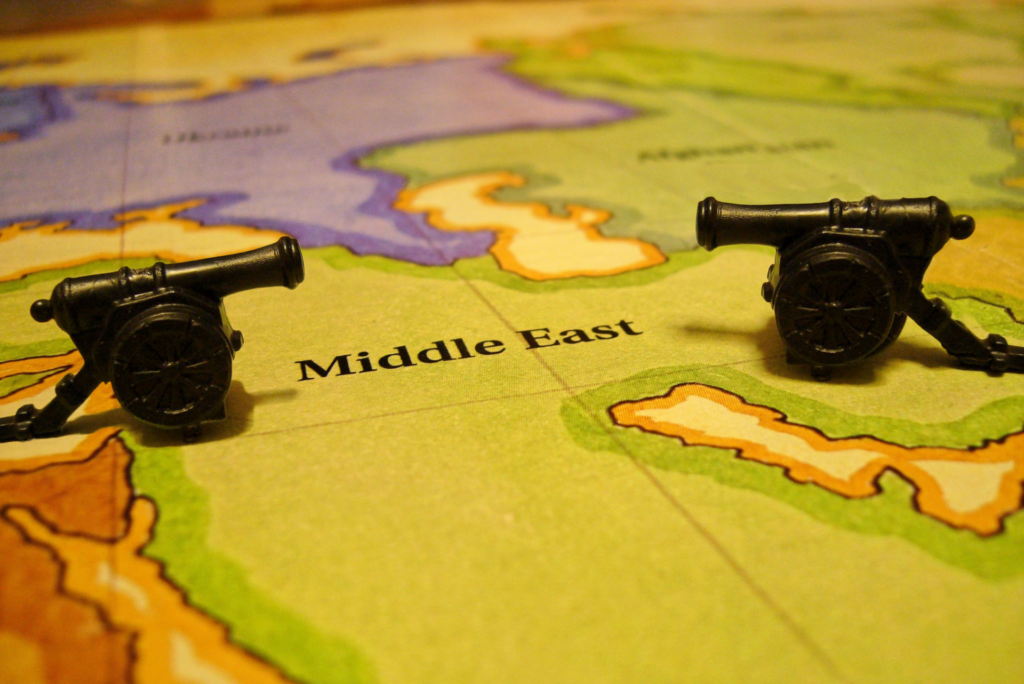Wargame simulated a conflict between Israel and Iran: It quickly went nuclear
By Henry Sokolski | February 27, 2024
 Credit: Stephen Coles, via Flickr CC-BY-SA (modified)
Credit: Stephen Coles, via Flickr CC-BY-SA (modified)
With the Gaza crisis, a nuclear Rubicon of sorts has been crossed: Elected Israeli officials—a deputy minister and a ruling party member of Parliament—not only publicly referenced Israeli possession of nuclear weapons, but suggested how such weapons might be used to target Gaza. This is unprecedented.[1]
More recently, Iran directly attacked an Israeli-manned intelligence outpost in Iraq. Iran also has inched within weeks of making several nuclear weapons and has made its military ever more immune to first strikes against its key missile and nuclear facilities. Iran and its proxies also now have long-range, high-precision missiles that could easily reach key Israeli targets.[2]
None of these developments is positive. For decades, most security analysts assumed Israel’s undeclared nuclear weapons were only deployed to deter attacks and that Iran would not dare to attack Israel directly. This after-action report describes a war game originally designed nearly two years ago. It directly challenges these assumptions and suggests that military strikes between Israel and Iran—including nuclear ones—are possible.
The Nonproliferation Policy Education Center held the game and its preparatory meetings—five separate sessions—in November and December of 2023. The 35 participants included Republican and Democratic Hill staff; US Executive Branch officials and analysts; leading academic scholars; national security and Middle Eastern think tank experts; and US military personnel.
The game consisted of three moves. After receiving a war brief and instructions from the Israeli prime minister, teams representing the Israeli Ministry of Defense, the Ministry of Foreign Affairs, and intelligence community formulated their preferred options for launching nuclear strikes against Iran. The prime minister selected one. Move two begins after the Israeli military carries out this strike. In move two, the teams were reconstituted to represent Israel, friendly Arab nations, and the United States and its European allies. Control played Iran, Russia, and China. Each team responded diplomatically and militarily to Israel’s initial nuclear strike against Iran. The game’s third and final move was a “hot wash” where participants discussed their insights.
The game starts in 2027 with Israeli intelligence reports that Iran is mating nuclear warheads to its long-range missiles. This prompts Israel to ask Washington to collaborate in a conventional military strike targeting key Iranian nuclear facilities and missile bases. Not wanting to be drawn into a major war with Iran, the United States demurs and instead offers Israel US standoff hypersonic missiles.
Israel uses these to target Iran’s key nuclear and missile sites. Almost immediately, Tehran’s proxies—Hezbollah, and Houthi rebels—respond with devastating conventional missile strikes against Israel. These attacks kill at least as many Israelis as during the October 7, 2023, Hamas raid. In response, Israel attempts to preempt further proxy military strikes by launching aerial strikes against proxy military strongholds. These attacks kill more than 2,000 Arabs.
Iran responds directly and takes advantage of the Israeli missile defenses being now degraded to strike key Israeli nuclear and government defense ministry buildings in Tel Aviv, killing more Israeli civilians. At the same time, Iran also announces that it has withdrawn from the Nuclear Non-Proliferation Treaty (NPT), thereby signaling its readiness to use nuclear weapons.
Israeli intelligence then learns that Israel’s previous conventional strikes against Iranian nuclear and missile sites failed to retard Iran’s integration of nuclear warheads with its missiles. When Israel shares this information with US officials and again asks them to approve a joint US-Israeli follow-on raid, Washington only offers “continued assistance” and tells Israel it should stop attacking Iran lest the fighting escalates to a nuclear exchange.
Israel swallows hard. Sensing that it now is isolated and that further Israeli conventional strikes are unlikely to scotch an Iranian nuclear strike, Israel’s prime minister decides attacking Iran with nuclear weapons is Israel’s only option. After consulting his war cabinet, he approves a non-lethal nuclear demonstration detonation over a remote location in Iran combined with conventional strikes against main Iranian nuclear facilities and military sites. Israel also launches cyber-attacks against Iran’s military communications networks and uses its back channels to make a private diplomatic appeal to Tehran to stand down further offensive action against Israel.
Israel’s actions, however, fail to bend Iran’s will to continue to wage war. Worse, the United States now urges Israel to stand down. Isolated and desperate, Israel concludes it has no choice: It launches a “precision” follow-on nuclear strike of 50 weapons against 25 Iranian military targets (including Russian-manned air defense sites). The aim is to cripple Iranian offensive forces and perhaps induce enough chaos to prompt the Iranian revolutionary regime to collapse. Almost immediately after the Israeli strike, however, Iran launches a nuclear attack of its own against an Israeli air base where American military are present.
With this move, the game ends.
Many critical questions remain unanswered. Would Israel or Iran conduct further nuclear strikes? Would Israel target Tehran with nuclear weapons? And vice versa, would Iran target Tel Aviv with nuclear arms? Would Russia or the United States be drawn into the war? These many basic unknowns helped inform each of the game’s four major takeaways:
The strategic uncertainties generated after an Israeli-Iranian nuclear exchange are likely to be at least as fraught as any that might arise before such a clash. An unspoken hope among security experts is that nuclear deterrence can work between Israel and Iran. Such optimism, however, discourages clear thinking about what might happen if deterrence fails and both countries use nuclear weapons. During the game’s play and hot wash session, participants emphasized how difficult it was to develop appropriate policy responses to Israeli or Iranian nuclear use as neither contingency was adequately considered before use. Precisely how much damage might Israeli nuclear strikes inflict against Iran’s population and underground military assets? Would Iran’s key nuclear and missile capabilities be knocked out or are they buried deep enough to resist nuclear strikes? What precisely might the political, diplomatic, military, and economic impacts be of such nuclear strikes? Would the world’s economies be “knocked out” or just “jolted” as a result? How would the United States, Russia, China, and other nuclear-armed countries respond to Israeli and Iranian nuclear use? Would they be drawn into the conflict? Would demands for proportionality guide US and allied responses? How likely would Israel be to share details of what targets it hit with precisely what weapons with outside parties including with its closest allies? After the game, none of the participants felt confident that they could answer any of these questions. To narrow these “unknowns” gaming possible Middle Eastern nuclear wars—both publicly and in classified settings—are needed. Ideally, such simulations would include officials and outside experts from Israel and neighboring Middle Eastern states. An explicit goal for these games would be to devise ways to deter first and subsequent, retaliatory nuclear weapons strikes. Such official gaming, however, has yet to take place publicly. And it is not clear either if it has been conducted in classified settings.
Although Israel and Iran might initially seek to avoid the nuclear targeting of population, such self-restraint is tenuous. Military analysts have rightly argued precision-guided munitions enable combatants to avoid hitting innocent civilians. Meanwhile, most nations have ratified the 1977 Protocol 1 of the Geneva Convention of 1949, which discourages targeting civilians and civil objects. Perhaps for these reasons, both Israel and Iran—neither of which is a party to Protocol 1—initially avoided targeting civilians with their nuclear weapons. In the game, however, even Israel’s initial decision to fire a harmless nuclear demonstration shot was considered controversial. The game’s Israeli defense minister and others wanted instead to strike Tehran to maximize chaos in hopes of inducing regime change. This option in the game’s second move was again promoted as being as reasonable as trying to limit civilian casualties. Ultimately, the Israel team chose instead to strike 25 military targets with 50 nuclear weapons. Israeli and US intelligence, though, could not clearly determine what collateral and military damage these “limited” military strikes inflicted. After Iran replied with a nuclear military strike of its own against a strategic Israeli airbase, the game ended. Yet, a third follow-on Israeli nuclear strike was a serious possibility now that the nuclear threshold was passed. But what might Israel target next? Much would depend on the power of arguments in Washington, Jerusalem, and Tehran for and against conducting further nuclear strikes and attacking population centers. In this regard, both US and Israeli officials appear to share a similar jus ad bellum (legal justifications for war) view of military proportionality. This shared view considers extensive collateral harm to innocents acceptable so long as it is necessary to achieve major military goals. This view, however, is not universally supported. Many of the United States’ closest allies, for example, believe that when there is a choice between inflicting less or more military damage to civilians and civil objects to achieve a military objective and an option that inflicts more harm is chosen over less harmful options, the damage inflicted should be viewed as being excessive to achieving legitimate military goals. To complicate matters, Washington officials often emphasize the importance of reducing indiscriminate harm as much as possible. This patchwork of views on military proportionality is confounding. Certainly, part of any effort to deter the future use of nuclear weapons against cities in the Middle East would benefit from public clarification of just what military proportionality might demand in such cases. Initially, this might be accomplished with track-two talks between former senior officials from the United States and Israel and, if possible, Iran. Yet another reason to hold such talks is to understand Iranian and Israeli messaging. In the game’s hot wash session, Israel was asked to reconsider its decision to make a second 50-weapon nuclear strike. The Israeli team was given a different Iranian diplomatic response to Israel’s move one demand that Tehran cease all offensive actions against Israel. The Israeli team was asked what they might do if Iran offered to cease offensive operations in exchange for an Israeli commitment to engage in mutual talks to eliminate Iranian and Israeli nuclear weapons. This softer reply made a significant difference: The Israel team said if it had received this response, it would have accepted Iran’s offer and would have held off launching a second nuclear strike.
Multilateral support for Israeli security may be essential to deter Israeli nuclear use but will likely hinge on Israeli willingness to discuss regional denuclearization. An isolated and desperate Israel is far more likely to use nuclear weapons than an Israel surrounded by friendly, supportive neighbors. This should inform further expansion of the Abraham Accords and other efforts at integrating Israel into the region’s economic and security affairs. Washington will continue to provide Israel much of the military assistance and cooperation it needs. Yet, Israel’s increasing diplomatic dependence on the United States should be a source of concern. In the game, Israel is disappointed when it asks for Washington to join in its major military operations against Iran. The United States’ unwillingness to be dragged into a major war with Iran and rejection of Israel’s request markedly increased the Israeli team’s desperation. If Israel’s security and economic future was much more integrated with its neighbors, such anxiety would likely be diffused. A desirable feature of such integration would be joint military training and exercises with Abraham Accord members to deter military provocations by Iran and its proxies. Yet another improvement could be to announce that, if Iran’s leadership continues to inch toward nuclear weapons, the West will no longer remain neutral regarding its overthrow and might well engage in information campaigns to undermine Iranians’ continued support of the regime. All these efforts could help deter Iran and dissuade Israel from resorting to nuclear weapons use. Yet, such regional security and economic collaboration is unlikely to happen unless the most important security goal—that of avoiding nuclear war and nuclear proliferation—is made explicit. This will require not only being more candid about the nuclear weapons risks associated with any “peaceful” nuclear energy program and the financial and security risks of building nuclear power facilities in the region, but also opening up the diplomatic aperture to reduce nuclear weapons threats. The later would necessarily require Israel and its closest ally, the United States, to be much more open to participating in regional denuclearization talks.
Little progress is likely in reducing Middle Eastern nuclear threats as long as the United States continues its public policy of denying knowledge of Israeli nuclear weapons. The current US policy is of not admitting that Israel possesses nuclear weapons. This policy[3] dates back to the Cold War when any admission of Israeli nuclear weapons would have likely prompted the Soviet Union to help Egypt or other Arab states get nuclear capabilities of their own. Those days are behind us. Yet, the Pentagon recently refused entirely to declassify early, official considerations of what multilateral talks about Middle Eastern denuclearization (including Israel’s) might entail.[4] Moreover, there is still an executive order making any public mention of Israel’s possession of nuclear weapons a security violation that could result in the revocation of an official’s security clearances and de facto put an end to the US military support to Israel under the Nuclear Non-Proliferation Treaty.[5]
Considering the strategic risks and uncertainties that a possible nuclear exchange between Israel and Iran revealed in this game, the formulation of proportionate military, political, and economic policies to deter nuclear use appears crucial. This requires gaming and careful planning—both efforts that the United States’ outdated policy toward Israel nuclear-related classification all but precludes.
Notes
[1] See Kawn Wei Kevin Tan, “An Israeli lawmaker is urging her government to use ‘everything in its arsenal,’ including ‘doomsday’ weapons, against Hamas,” Business Insider, October 11, 2023, available at https://www.businessinsider.com/israeli-lawmaker-urged-government-to-use-nuclear-weapons-against-hamas-2023-10; “Israel minster renews call for striking Gaza with ‘nuclear bomb,’” MEMO Middle East Monitor, January 24, 2024, available at https://www.middleeastmonitor.com/20240124-israel-minister-renews-call-for-striking-gaza-with-nuclear-bomb/; and Scott Ritter, “Israel’s Nuclear Weapons In the Spotlight,” Energy Intelligence, November 13, 2023, available at https://www.energyintel.com/0000018b-c8be-dac7-a7ab-ddfe44520000.
[2] See David Albright, “How quickly could Iran make nuclear weapons today?” ISIS, January 8, 2024, available at https://isis-online.org/uploads/isis-reports/documents/How_quickly_could_Iran_make_nuclear_weapons_today_January_8.pdf; Parisa Hafezi and Timour Azhari, “Iran says Revolutionary Guards attack Israel’s ‘spy HQ’ in Iraq, vow more revenge,” Reuters, January 16, 2024, available at https://www.reuters.com/world/middle-east/irans-revolutionary-guards-say-they-have-attacked-espionage-centers-iraqs-erbil-2024-01-15/; Joseph Dempsey, “Silo mentality – Iran’s Haji Abad missile base,” IISS, May 4, 2021, available at https://www.iiss.org/en/online-analysis/military-balance/2021/04/iran-haji-abad-missile-base/; and Jon Gambrell, “An Iranian nuclear facility is so deep underground that US airstrikes likely couldn’t reach it,” Associated Press, May 22, 2023, available at https://apnews.com/article/iran-nuclear-natanz-uranium-enrichment-underground-project-04dae673fc937af04e62b65dd78db2e0.
[3] See Adam Entous, “How Trump and Three Other U.S. Presidents Protected Israel’s Worse-Kept Secret: Its Nuclear Arsenal,” The New Yorker, June 18, 2018, available at https://www.newyorker.com/news/news-desk/how-trump-and-three-other-us-presidents-protected-israels-worst-kept-secret-its-nuclear-arsenal.
[4] See National Security Archive, “Memorandum of Conversation, “Task Force. Meeting No. 1-Arms Control of the Near East,” 27 March 1063, Top Secret, Excised copy,” December 6, 2023, available at https://nsarchive.gwu.edu/document/30842-document-6-memorandum-conversation-task-force-meeting-no-1-arms-control-near-east-27 and “Recent Nuclear Declassifications and Denials: The Good, the Bad and the Ugly,” December 6, 2023, available at https://nsarchive.gwu.edu/briefing-book/nuclear-vault/2023-12-06/recent-nuclear-declassifications-and-denials-good-bad-and
[5] For a rare, official public reference to “DOE Classification Bulletin WPN-136 on Foreign Nuclear Capabilities,” see United States Department of Energy Office of Hearings and Appeals, In the Matter of Grant F. Smith, August 25, 2015, Case No. FIC-15-0003, available at https://www.energy.gov/sites/prod/files/2017/01/f34/FIC-15-0003.pdf.
Editor’s note: This article is a product of a wargame, “Gaming Israeli Nuclear Use: Pandora Unleashed,” organized by the Nonproliferation Policy Education Center (NPEC). The full report is available here.
Together, we make the world safer.
The Bulletin elevates expert voices above the noise. But as an independent nonprofit organization, our operations depend on the support of readers like you. Help us continue to deliver quality journalism that holds leaders accountable. Your support of our work at any level is important. In return, we promise our coverage will be understandable, influential, vigilant, solution-oriented, and fair-minded. Together we can make a difference.
Keywords: Iran, Israel, Israel-Iran relations, Middle East, Russia, United States, nuclear escalation, nuclear war, wargame
Topics: Nuclear Weapons
















Let’s not forget that the whole issue could get solved if the US simply cut off aid to Israel. There are historical precedents. Carter cut off aid to Somoza and that government fell almost immediately. Clinton cut off aid to Indonesia, and the very next day it withdrew its forces from East Timor.
Stupid comparisons. Neither Indonesia or Somoza faced wars and possible extermination. Israel does, your suggestion will only push
Israel to double down on Nuclear and Biological weapons and to declare to Iran and its proxies we will all go down together.
Of course, one could anchor the exercise in current context: Iran has accelerated its documented nuclear enrichment and demonstrated its long range missiles accuracy in recent weeks, as Israel was deliberately engaged in Gaza and Lebanon by Iranian-trained, armed, sponsored proxies, and the U.S. is pulled in via Huti attacks.. Should Israel (and others) decide to remove the Iranian (and allies) threat to regional balance of power/petrodollar regime/regional nuclear proliferation race, they will aim at removing the regime, not (just) the nuclear program. There will be only one attempt. Having said that, should Iran decide to change its opposition to… Read more »
Israel-Iran situation has markedly escalated since this imformative article. Israel attacked an Iranian diplomatic building in Syria killing high profile Iranian military officials and Iran responded with a barrage of drone, cruise missile and ballistic missile strike on Israel. An unprecedented development. Almost all of them were intercepted by Israeli, US, UK and French air defenses but had Iran doubled the number of projectiles it used, Israeli, etc. air defenses would have been overwhelmed causing enormous destruction, firstly to air defense equipment, communication and radar stations and then to military bases. That might have prompted a nuclear response from Israel.… Read more »